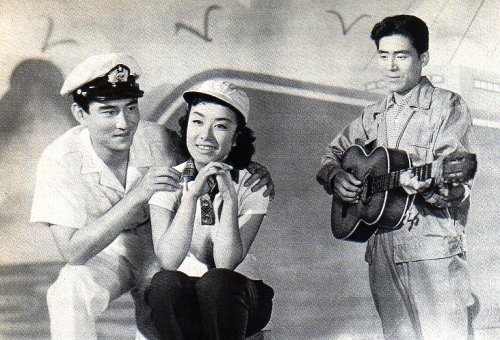
Another of Nikkatsu’s crime inflected pop song movies, Inn of the Floating Weeds (浮草の宿, Ukigusa no Yado) makes space for the singer of the song which gives the film its name, Hachiro Kasuga, but only in a minor role as a supportive friend. Directed by Seijun Suzuki under his birth name Seitaro (he’d change it to Seijun for Underworld Beauty the following year), the film is in some ways typical of his early work as a B-movie director at the studio but nevertheless displays flashes of his later brilliance in its unconventional composition and wistful sense of irony.
Company man Shunji (Hideaki Nitani) gets into a fight during which Shida, a high ranking executive at Marubishi construction, is stabbed to death. Shunji is kicked into the water and left for dead, while his fiancée, Kozue (Hisano Yamaoka), pines for him at a nearby bar. Five years later Shunji resurfaces hoping to reunite with Kozue after having fled to Hong Kong and taken a job at a shipping company. At the bar, however, he discovers a woman that looks exactly like his lost love but turns out to be her younger sister, Mio (also played by Hisano Yamaoka), the bar’s madam and apparently the mistress of Murayama (Toru Abe), the current head of Marubishi.
Shunji’s survival and subsequent reappearance is inconvenient for everyone so it’s no surprise that Murayama wants to have him bumped off, but Shunji is determined to stay and find out what’s happened to Kozue who, according to her sister, went missing in suspicious circumstances three years earlier while desperately searching for Shunji.
Haunted by memories of lost love, Shunji finds himself drawn to the mysterious Mio who closely resembles her sister, while pulled towards a nexus of criminal activity unwittingly positioned between Murayama’s Marubishi and the avaricious interests of his American colleagues operating out of Hong Kong. Indeed, Shunji has himself it seems taken on an alternate identity as Hong Konger Kang Ho-chun, interpreter to the mysterious Mr. Green (Harold Conway). Perhaps still naive, Shunji appears to be unaware of his boss’ shadiness, warned off by good Samaritan Haruo (Hachiro Kasuga) who rescues him after he’s beaten up by Marubishi goons and allows him to rest in his apartment where he’s nursed back to health by his cheerful kid sister Yuri (Ikuko Kimuro).
The strange goings on on the Saganmaru perhaps testify to an ambivalence with Japan’s new globalising presence which echoes through Nikkatsu’s “borderless” action dramas. Mr. Green is certainly not on the level, later revealed to be involved with drug smuggling through Marubishi and employing a large number of Chinese stewards (he operates out of Hong Kong after all) which plays into a sense of Sinophobia common across the series. The major problem, however, is Murayama whom Shunji later learns tried to assault Kozue after he left and may be connected with her disappearance. Perhaps trying to warn him off, Mio fires back at Shunji that this all his own fault, that Kozue couldn’t live with the knowledge he was a murderer and in the end he broke her heart, while he meekly protests his innocence and vows revenge on Murayama.
Meanwhile, he’s pulled back towards innocence by Haruo and his relentlessly cheerful sister who has obviously taken a liking to him. Mio, echoing the femme fatale, remains enigmatic, concealing key information about her sister, later confessing that she too has been desperate for vengeance but fears that Murayama has grown too powerful. Haruo, singing the mournful song about past regrets and lost love, observes from the sidelines trying to decide if Shunji is rotten inside or merely in danger of being swallowed by a vortex of crime and violence.
Yet, as it so often is, the gangster world is in danger of collapse, destroying itself through internecine power struggles and petty betrayals. Murayama thinks he’s the top dog but there’s always someone agitating from below. Shunji, didn’t kill Shida, and maybe he’s close enough to finding out who did, clearing his name while figuring out what happened to Kozue, but in someways it hardly matters because the true battle is for the future, not the past. Like the singer of the song, he reflects on what a fool he’s been, resolving to put the past aside as he walks towards a less complicated future and an eventual return to a compassionate and forgiving society.
Title song by Hachiro Kasuga


